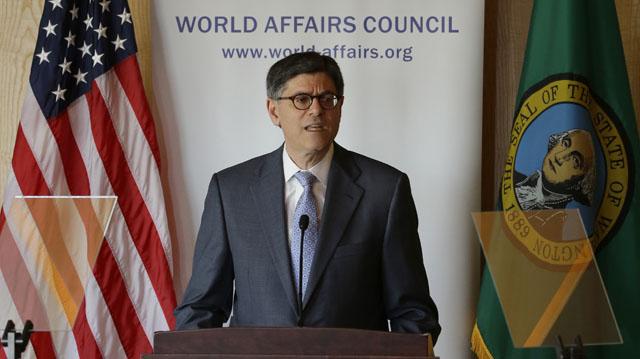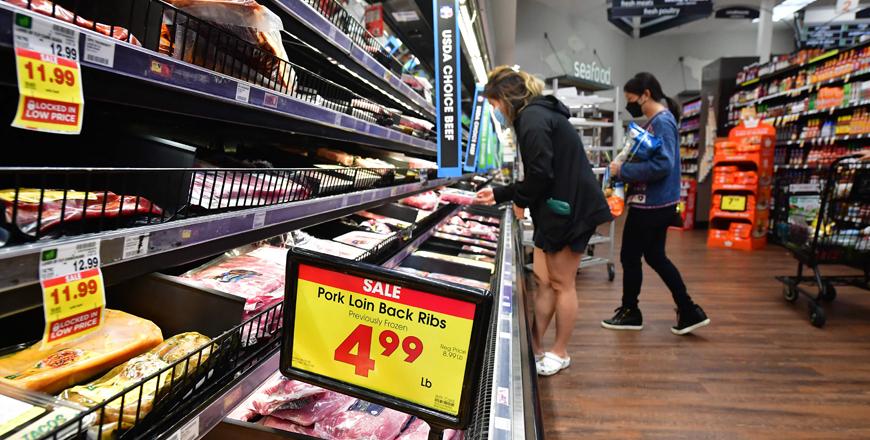You are here
US steps up calls on Europe to do more for its economy
By Agencies - Nov 13,2014 - Last updated at Nov 13,2014

SEATTLE/WASHINGTON — The United States on Wednesday stepped up calls on European policy makers to do more to avoid a "lost decade" of low growth, saying steps taken by the European Central Bank (ECB) may not be sufficient on their own.
US Treasury Secretary Jack Lew gave an unusually blunt assessment of what he thinks Europe needs to do, arguing that France and Italy should rein in budget deficits more slowly and that it was "critical" Germany and the Netherlands open their fiscal purse strings.
"Resolute action by national authorities and other European bodies is needed to reduce the risk that the region could fall into a deeper slump," Lew said at the World Affairs Council in Seattle.
Speaking ahead of the summit of leaders from the Group of 20 (G-20) nations in Australia this week, he said eurozone countries should pursue a combination of fiscal, monetary and structural policies to support growth.
His comments suggested the eurozone's sluggish recovery will come under the G-20 spotlight, as it has during their last two sessions.
The 18-nation
eurozone is skirting close to recession, growing just 0.1 per cent in the second quarter, and the currency bloc is also not far from outright deflation.
To prop up the economy and move inflation higher, the ECB has started to pump more money into the region's banking system, and has said it is ready to take further action if needed.
In contrast, the US economy is growing solidly. Lew warned, however, that the world could not rely on strong US growth alone to support demand. He urged countries to use fiscal policies to boost demand if they could afford to.
Germany, Europe's biggest economy, has been under particular pressure to increase government stimulus to support demand in the eurozone.
Lew also said Italy and France should pursue structural reforms but cautioned it was still unclear whether such reforms will be enough in the case of Japan.
Japan has launched a broad programme of monetary easing, spending and reform to generate economic growth and pull out of damaging deflation. At the same time, Tokyo has raised taxes in a bid to rein in its large deficits.
Lew said that if Japanese officials decided to go ahead with another planned consumption tax increase, they should use other policies to more than offset the drag on the economy.
He held out the US recovery from the 2008-2009 Great Recession as an example for Washington's main G-20 partners.
"Over the past four and a half years, the private sector has created more than ten and a half million new jobs, the longest stretch of private sector job growth in our nation's history," he said.
"In fact, we have created more jobs since the pre-crisis peak than Europe and Japan combined," the treasury secretary added.
But he also said that the United States itself needs to do more to strengthen economic momentum, citing President Barack Obama's proposals for immigration and tax reforms, a higher minimum wage, and more spending on infrastructure.
Separately, the International Monetary Fund (IMF) on Wednesday warned of downside risks to its growth projections for the eurozone, and urged the ECB to act if prices in the currency bloc continue to drift lower.
The IMF's warning echoes an increasing fear among global policy makers that Europe is not on track to spur economic growth, something that should be a key topic for discussion when leaders of the G-20 economies meet in Australia.
The IMF, the Washington-based lending institution charged with policing global economic and financial stability, in October predicted the eurozone would expand 0.8 per cent this year and 1.3 per cent next year.
But a raft of disappointing data in the last month has put even those modest economic projections in doubt, including "surprisingly" weak data for domestic demand in Germany, the eurozone's biggest economy, the IMF said in a report prepared for the G-20 meeting.
A report on Friday is expected to show the eurozone's economic growth in the third quarter is in line with the 0.1 per cent pick-up posted in the prior three months. Prices have risen just 0.4 per cent over the past year.
The ECB has a mandate to keep inflation below but close to 2 per cent.
The IMF said it welcomed recent moves by the ECB to keep interest rates low and pump more money into the region's banking system.
"But if the inflation outlook does not improve and inflation expectations continue to drift down, the ECB should be willing to do more, including purchases of sovereign assets," the IMF said in its report.
It also warned of the risks tied to geopolitical tensions in Ukraine and the Middle East, and of financial market corrections due to divergent policies from the world's major central banks.
The US Federal Reserve last month decided to end its bond-buying stimulus programme, while the Bank of Japan has dramatically increased its pace of money creation and the ECB agonises over whether to follow suit.
A deep stock market sell-off in mid-October also spooked policymakers concerned that a market rout could hurt confidence.
"The recent increase in volatility is a reminder about the challenges ahead," the IMF said.
Related Articles
US Treasury Secretary Jacob Lew warned the eurozone this week to pay heed to the risk of deflation, adding pressure on European authorities and the European Central Bank (ECB) to boost growth.
The world's 20 biggest economies must focus on higher labour productivity and become more competitive and innovative if they want to deliver on a pledge to boost economic growth, the Organisation for Economic Cooperation and Development (OECD) said on Monday ahead of a Group of 20 (G-20) meeting.
PARIS — The war in Ukraine will heavily weigh down on economic growth in the eurozone, the International Monetary Fund (IMF) said on Tuesday












